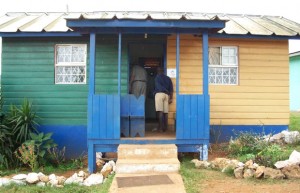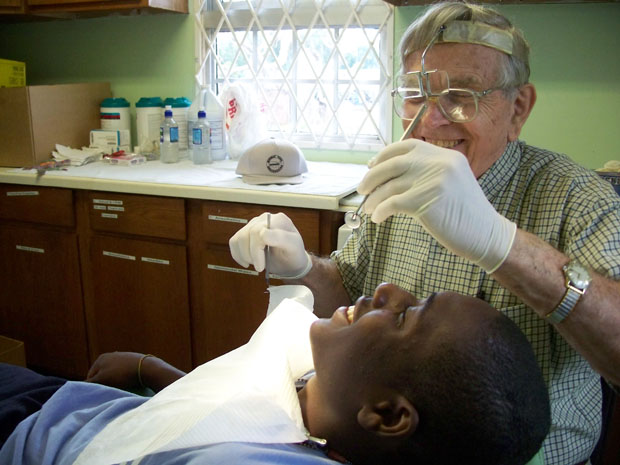
Though perhaps not as attractive as Dr. Check’s regular practice in Norristown, the dental clinic (shown above) that he runs for orphans in Jamaica provides a vital service. His work has produced remarkable improvements in children’s dental health.
When Dr. Thomas M. Check took time from his dental practice to travel to Jamaica in 1965 to provide dental care to children with needs at a home conducted by the Religious Sisters of Mercy, he could not know that in March 2014 he would be making his 50th such trip. That is because the need is still there.
Dr. Check, 86, began life in Wilkes-Barre, Pa., where he grew up and attended Sacred Heart Slovak School and Coughlin High School. He knew that he wanted to become a professional and he wanted to be his own boss, but most of all he wanted to make a difference.
Starting out at Bucknell Junior College (now Wilkes University) he settled on dentistry for his future and continued his dental studies at Temple University with resident programs to follow at the University of Pennsylvania Hospital and St. Joseph’s Hospital in Philadelphia.
By the early 1960s he was fairly established in a joint dental practice, and life was good. In 1953 he had married Elizabeth (Betty) Kern, who was also from the Wilkes-Barre area. When children didn’t come along in the usual fashion they turned to the Philadelphia Archdiocese’s Catholic Social Services. In a relatively short span of years they adopted four children, Bethanne Bernadette, Thomas, Mary Rose and David.
Something happened in 1962 that would alter his life and that of his family. Approximately at the same time Jamaica gained its independence from Great Britain, the Sisters of Mercy who conduct the Alpha Orphanage in Kingston petitioned the Catholic Medical Mission Bureau in New York, asking if a dentist could be provided to care for the children’s teeth. At that time the only dentistry provided to the orphanage was extractions; nothing was being done to save teeth.
[hotblock]
It took about a year before the request filtered down to Philadelphia. Dr. Hugh Day, who had experience in public health, took up the cause. Dr. Check heard about this and joined forces with him. His training was in oral surgery, not public health, but he was willing to learn.
Between the two of them they came up with a plan following a working program issued by the World Health Organization through which children’s cavities would be prevented. If they occurred, the teeth could hopefully be repaired, not extracted. The key feature of this Incremental Care Program, tailored to meet the needs of the Sisters and the children, is consistent follow-up from year to year.
In 1964 Dr. Day went to Jamaica for two months to put the program into place. The young man who had barely started in private practice discovered when he returned home that he had lost most of his patients.
Dr. Check, who was better established and was in a joint practice, agreed he would go in future years starting in 1965.
“I always had it in me (that) I wanted to do dentistry for a group that had no outlet for care,” he said. “It was my personal vision and my deep desire.”
Betty wasn’t as certain. “Tom, we are married, we want a family, we have a home. This is what we do,” she said.
The plan was for Betty and the eldest two children to accompany him to Jamaica, even though their eldest, Bethanne, was in remission after radiation therapy for a serious cancer.
“Look at it this way,” he explained to Betty, “Bethanne has a very serious disease, and we are going down in January and February, the very coldest months of the year up here. It will be the kindest weather for her in Jamaica.”
Betty saw it really was a sensible plan, but to complicate things further, she broke her leg. Off they went anyway. Dr. Check was right; it was wonderful for Bethanne and Tom, who loved romping in the sun with the children of the home. They literally had a ball.
“Mom,” Bethanne asked Betty, “What do I have to do to get skin like theirs?”
Dr. Check saw approximately 600 Jamaican children that year, doing what dentists do: filling teeth, extracting those too far gone, cleaning teeth and teaching oral hygiene.
Betty kept the meticulous records on each child that would be critical in future examinations to measure the efficacy of the program.
This is not a happily ever after story.
“That August my daughter died, but she was so happy those two months in Jamaica,” Dr. Check said.
In spite of their sorrow, the Checks returned to Jamaica the next year, because after that initial experience, Betty was just as hooked as was her husband. Future visits would be for just two weeks, because of all the groundwork that was laid the previous two years. Dr. Check did the dentistry and Betty kept the records.
Many years at least some of their children would come along. This was possible because Betty was a teacher by profession and she would home school them in Jamaica.
In the beginning, Dr. Check recalls, his office was a converted barn with a barber chair. He would bring along all of the needed supplies, either paid for by himself and Betty or through the generosity of kind donors.
Now there is a proper dentist office and Dr. Check covers not only Alpha, but Don Bosco, another facility in Manchester, Jamaica. The clientele is boys, perhaps abandoned, orphaned or troubled. While he’s there he also treats the Sisters and the lay staff and their families.
How effective is the work? According to a report drawn up in 2012, when he started the average boy leaving the orphanage at 18 had eight missing teeth. Now through restorative work performed by Dr. Check and auxiliaries along with improved local staffing there is only one missing tooth for each 10 students.
For many years the Check family parish has been St. Rose of Lima in North Wales, Montgomery County. This is where Father Roland Slobogin first met Dr. Check after being assigned as parochial vicar at St. Rose. One of his first experiences was a visit to the Check home for a Sunday evening Scripture group.
“He is an inspiration. What he gives to people isn’t just dentistry, he enters into their lives with faith and joy,” Father Slobogin said. “He is a well-rounded man who keeps up (with) new trends in both dentistry and his faith. He is very disciplined, and actively promotes proper diet and physical activities.”
Although he left St. Rose in 1986, Father Slobogin has continued to visit Dr. Check for dentistry, but most important for friendship.
When Dr. Check visits Jamaica these days, he brings along at least one technician to help, perhaps to give fluoride treatments, and also others who have volunteered.
Sister of Mercy Janet Baker, a Gwynedd-Mercy College professor and an expert in organization, made several trips to Jamaica with Dr. Check. She assisted with staff workshops for teachers, vocational and child care staff and became involved in strategic planning for the administrative staffs.
“Tom has a missionary desire and it was a privilege to go with him,” Sister Janet said. He went young and he stayed. When he and Dr. Day were first invited many of the children were getting sick because of their bad teeth. That doesn’t happen now.”
For most years, up until her death in 2008, Betty was his loyal assistant and chief supporter. At one point a local official, because of the longevity of their service, wanted to take Tom and Betty to meet the Governor General of Jamaica. Betty wouldn’t have it.
“If Tom wants to go he can, they don’t need me,” she said. “I do this for Jesus.” That was good enough for her husband. If she wouldn’t go, neither would he.
“She was a very big part of it — packing, organizing, collecting data. It took a team to do it,” said Adam Check, Thomas and Betty’s grandson through their son, David, and himself a volunteer with his grandfather for a number of years.
“Being exposed to this often-neglected human aspect of poverty was personally very revolutionary and something I think everyone should experience,” Adam wrote in an article about his grandfather that appeared in the Pennsylvania Dental Journal May/June 2011.
“His parents were immigrants and he tries to give back,” Adam Check said. “He is very persuasive and commands the conversation. He has a drive in him most people do not have. He is very religious and has a really good heart.”
In spite of his age, Dr. Check is still working at his Norristown office three days a week with his son and partner, Thomas. He is also an active member and lector at St. Rose of Lima.
“I never wanted to be known as a wooly do-gooder,” Dr. Check protests. “My wife was different; she was doing it for Jesus.”
He may not realize it, but so was he. As Jesus himself said, “Whatever you did for one of these least brothers of mine, you did for me.”
***
Lou Baldwin is a freelance writer in Philadelphia.
PREVIOUS: Single man, 52, takes leap of faith through adoption
NEXT: Eyeing retirement, Cardinal O’Hara president reflects on career in education




Share this story